Digimon Ghost Game is available in streaming form on Crunchyroll
In the near future, the world is surrounded by holograms. However paranormal phenomenon frequently occur involving these holograms – with rumours on blogs and social media referring to these events as "Hologram Ghosts". Hiro Amanokawa is middle school freshman at Hazakura Academy, where he attends with his dorm leader Kiyoshiro Higashimitarai. Ruli Tsukiyono meanwhile attends an all-girls school, and runs a popular occult-related social media account.
One day Hiro meets Gammamon, a mischievous Digimon entrusted to him by his father – who is revealed to be trapped in the Digital World. Soon after Kiyoshiro and Ruli meet their own Digimon partners – Jellymon and Angoramon. The three then become sucked into this world of strange phenonema, where the "Hologram Ghosts" are revealed to be Digimon that have found themselves in the human world and are causing trouble.
Much like its name suggests, Digimon Ghost Game is what you get when its creators strive to make the first fully-fledged Digimon horror series. While the franchise has always been partial to a moment of horror, previous examples are nothing quite like this. Combining Yokai elements from traditional Japanese folklore with a more modern setting and common J-horror tropes, Ghost Game is fully prepared to push the boundaries of just how far you can take a kids' show. Though not especially gory, the series features countless examples of kidnapping, body horror and in some extreme cases just plain old murder. Something like someone having mushrooms grow out of their body or having their "future" stolen from them might sound like pretty stock plots on paper, but Ghost Game presents them in a way that rarely fails to make them both visibly and emotionally chilling. More often than not the core cast fall victim to these stock plots themselves as well, and even though as a viewer you know they'll come out the other side okay that doesn't stop them being put through the ringer beforehand. If the victims of these Digimon manage to survive, it's fair to say that they'd be left with a healthy dose of trauma.
But while some of these Digimon commit some pretty horrific acts over the course of the series, interestingly Ghost Game isn't so fast to paint all of them as villains. While in the rare instances that one commits a truly unspeakable act (or at least proves to be remorseless about it) the ensuing battles end in their deletion, more often than not the heroes will defeat them and then try to properly integrate them into human society. There's an argument to be had as whether some of these Digimon truly deserve this level of forgiveness, but overall it's nice how the series recognises the Digimon as different creatures that have been thrust into a world they don't truly understand either.
But while some of these Digimon commit some pretty horrific acts over the course of the series, interestingly Ghost Game isn't so fast to paint all of them as villains. While in the rare instances that one commits a truly unspeakable act (or at least proves to be remorseless about it) the ensuing battles end in their deletion, more often than not the heroes will defeat them and then try to properly integrate them into human society. There's an argument to be had as whether some of these Digimon truly deserve this level of forgiveness, but overall it's nice how the series recognises the Digimon as different creatures that have been thrust into a world they don't truly understand either.
These horror storylines only really lend themselves to "one and done" episodes, so unlike previous Digimon series Ghost Game takes the rather unique approach of being an almost entirely episodic series. Behind the scenes information has revealed that this is because Toei Animation feared that the generation of its target audience have "lower attention spans" thanks to the likes of YouTube and TikTok and thus would be put off by an extended plot. Whether this is true or not is debatable, but I do like the notion that kids couldn't handle an ongoing plot but they can handle all the various trauma and body horror. Nevertheless, I would argue that Digimon Ghost Game have little in the way of an overarching story is not a bad thing. Rather than be preoccupied with making sure everything fit together Ghost Game is instead a true celebration of the horror genre -drawing from a wide variety of inspirations across its 67-episode run. Not only does it thrive on the atmosphere, but the limited time frame each episode has to tell its story means the pacing never drags. Each week you never know what kind of horror story you’re going to get, and that’s where the fun lies.
The minimal overarching plot isn't just made up for by the strength of these episodic adventures, it also comes from how likeable its main cast is. Ghost Game works with the relatively small cast of three humans and three Digimon partners, but it does very well at giving them all a good range of personalities and character types as well as providing interesting dynamics between them all. Hiro and Gammamon share an older/younger brother dynamic, with Hiro the headstrong reliable protagonist and Gammamon his faithful partner. Compare that to Kiyoshiro - a cowardly teenage genius who displays signs of a split personality - becoming confident and level-headed in a crisis. His partner is Jellymon, a mischievous Digimon who expects to be treated like a queen. The pair are like polar opposites, but the affection and respect they have for each other makes them a great partnership. Finally there’s the outgoing Ruli and pacifistic Angoramon, who joins his human partner after enjoying her piano playing. While the series could definitely have benefitted more from delving into their backgrounds (particularly Kiyoshiro as he’s the least straightforward of them), what we’re presented with onscreen is enough to get a good sense of each of them.
The show does however feature a healthy amount of side characters, many of whom are Digimon that had been causing trouble themselves previously in the series. These include fan favourites such as Mummymom and Airdramon, as well as lesser known/newcomer creatures like Ryudamon, Bokomon and Espimon. Similarly Hiro, Kiyoshiro and Ruli's friends and classmates are series regulars – usually as unfortunate victims to the Digimon of the week. Again there's an argument about how lightly some of these Digimon get off given the havoc they cause, but it's a good way to introduce a network of Digimon support characters for our heroes. Similarly it's nice to see how they then choose to properly integrate themselves in the human world once they've been set straight on what is and isn't acceptable.
When it comes to power-ups and Digivolution in typical Digimon format Gammamon could easily be classed as the "lead" Digimon thanks to having more digivolutions (four Adult/Champion forms as opposed to the others one – nicely conveying the branching evolution the Digimon franchise has that's so often ignored in the shows) and more fight sequences, there's still a relatively good balance held between the three. Each of them digivolves all the way up to the Ultimate/Mega stage, so there isn't so much of a case of one being considerably stronger than the others. The limited cast combined with the relatively long episode count means that the introduction of new evolutions is gradual too, so that there's plenty of time spent with each form instead of rapidly moving on to an even stronger one. Furthermore there are some nice personality shifts between the forms without losing the essence of the characters, such as the generally relaxed Angoromon becoming the more ferocious Lamortmon, or the boisterous Jellymon becoming more serene as Thetismon (and in turn, then gaining an almost idol-like superhero persona as Amphimon). Though the team gain allies that occasionally join the battle as time goes on, it’s a strength of the series that it can keep things interesting between these three Digimon alone AND doesn't always have to resort to their most powerful form once it's been introduced.
When it comes to power-ups and Digivolution in typical Digimon format Gammamon could easily be classed as the "lead" Digimon thanks to having more digivolutions (four Adult/Champion forms as opposed to the others one – nicely conveying the branching evolution the Digimon franchise has that's so often ignored in the shows) and more fight sequences, there's still a relatively good balance held between the three. Each of them digivolves all the way up to the Ultimate/Mega stage, so there isn't so much of a case of one being considerably stronger than the others. The limited cast combined with the relatively long episode count means that the introduction of new evolutions is gradual too, so that there's plenty of time spent with each form instead of rapidly moving on to an even stronger one. Furthermore there are some nice personality shifts between the forms without losing the essence of the characters, such as the generally relaxed Angoromon becoming the more ferocious Lamortmon, or the boisterous Jellymon becoming more serene as Thetismon (and in turn, then gaining an almost idol-like superhero persona as Amphimon). Though the team gain allies that occasionally join the battle as time goes on, it’s a strength of the series that it can keep things interesting between these three Digimon alone AND doesn't always have to resort to their most powerful form once it's been introduced.
As previously mentioned Ghost Game uses the Vital Bracelet as its "Digivice" of sorts, and its integration into the series is fairly well done. While it may not really play on the specifics or functions of the toy itself, the way they remain a presence in the series does succeed in making the toy appealing. Simple as it may look the visual of the Vital Bracelet during the digivolving scenes is eye-catching, and the wrist-watch nature of it gives it a sort of everyday look whilst also being special. Going off on a tangent for a moment I bought a Vital Bracelet last year and have had a lot of fun with it (although I'm more in it for the Kamen Rider and Ultraman stuff than Digimon). It's a very basic pedometer, but fun to play with and feels a bit more involved than a typical V-Pet.
If anything, Ghost Game's biggest issue was actually attempting to have an overarching plot. The series had a strong set up with the disappearance of Hiro's father combined with the arrival of Digimon in the human world, but after that anything remotely serialised was drawn out at an excruciating pace. For example, whenever GulusGammamon (Gammamon’s dark fourth Digivolution) appeared you knew things were about to get serious (and they usually did), but the moments – along with any others that contributed toward a wider story, would be promptly forgotten the following week in favour of more episodic shenanigans. This goes on for the entirety of Ghost Game's run, and doesn't really serve to please anyone. Those looking for more serialised story-telling from the series will be constantly disappointed at the lack of development it has, while those fully on board with its style of one-off stories will be baffled at why the show feels it needs to do something bigger when it's doing such an amazing job carving out its own niche.
With the promise of a bigger story but seemingly no time to dedicate to it, something eventually has to give – with Ghost Game really suffering when it comes to ending. Every bit of wider story-telling the series had up its sleeve is crammed into the last four or so episodes, and the end result is underwhelming to say the very least. As a looming disaster threatens both the human and digital worlds, our heroes are forced to venture into the Digital World to save the day. It’s all very familiar territory for the Digimon franchise, and because of this arguably something Ghost Game would have been better off avoiding altogether. Suddenly the kind of story some instalments have taken a whole series to tell is crammed into a handful of episodes, and Ghost Game becomes this mad rush to ensure it's ticked off everything before it comes to a fairly unsatisfying conclusion. These episodes do however have perhaps the strongest action element of the entire series, so are deceptively good at luring you in with that alone. While the ending of the series does potentially leave some wiggle room for future entries should the occasion ever arise, it also comes across as conclusive enough to be considered "the end".
If anything, Ghost Game's biggest issue was actually attempting to have an overarching plot. The series had a strong set up with the disappearance of Hiro's father combined with the arrival of Digimon in the human world, but after that anything remotely serialised was drawn out at an excruciating pace. For example, whenever GulusGammamon (Gammamon’s dark fourth Digivolution) appeared you knew things were about to get serious (and they usually did), but the moments – along with any others that contributed toward a wider story, would be promptly forgotten the following week in favour of more episodic shenanigans. This goes on for the entirety of Ghost Game's run, and doesn't really serve to please anyone. Those looking for more serialised story-telling from the series will be constantly disappointed at the lack of development it has, while those fully on board with its style of one-off stories will be baffled at why the show feels it needs to do something bigger when it's doing such an amazing job carving out its own niche.
With the promise of a bigger story but seemingly no time to dedicate to it, something eventually has to give – with Ghost Game really suffering when it comes to ending. Every bit of wider story-telling the series had up its sleeve is crammed into the last four or so episodes, and the end result is underwhelming to say the very least. As a looming disaster threatens both the human and digital worlds, our heroes are forced to venture into the Digital World to save the day. It’s all very familiar territory for the Digimon franchise, and because of this arguably something Ghost Game would have been better off avoiding altogether. Suddenly the kind of story some instalments have taken a whole series to tell is crammed into a handful of episodes, and Ghost Game becomes this mad rush to ensure it's ticked off everything before it comes to a fairly unsatisfying conclusion. These episodes do however have perhaps the strongest action element of the entire series, so are deceptively good at luring you in with that alone. While the ending of the series does potentially leave some wiggle room for future entries should the occasion ever arise, it also comes across as conclusive enough to be considered "the end".
That all said, an unsatisfying ending certainly isn't enough to make Digimon Ghost Game any less enjoyable. While its attempts at a bigger storyline were all over the place, its dedication to giving the franchise a real J-horror edge is nothing short of inspiring. From the slightly eerie to the downright disturbing, Ghost Game's imagination for combining the franchise with the twisted tales of Japanese Yokai is both captivating and chilling. It's a comfortable watch that can easily be ducked in and out of thanks to its largely episodic nature, and its full embrace of the horror aspect can act as a great gateway into the wider genre. Even without a bigger storyline to hold it all together, Digimon Ghost Game is a series with a lot to offer.


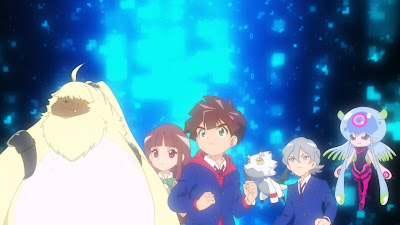

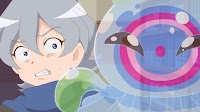

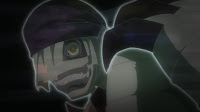
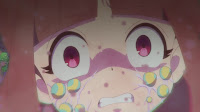

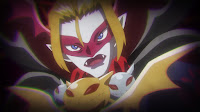

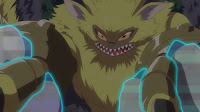

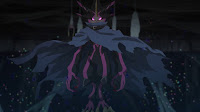


3 comments:
Really doesn't feel like it's been a around year and a half since this show started, but it was a really fun time. Looking forwrd to whatever the next installment of digimon might be, whenever that may be.
Ghost Game is painfully mediocre. It started out as really promising, but the writing declined over time. Lemme tell ya, as someone who skipped weeks and would binge episodes back-to-back on multiple occasions, the series gets real repetitive, real fast. It's not helped by the fact that the main characters are static and never truly grow as people, especially Hiro, who is a very reactive protagonist with little agency. Granted, that can be said for all of them since outside of their focus episodes, Ruli and Kiyo don’t do much either. Plus, the MOTW formula gets tedious around the second half of the series (around Espimon's debut). Speaking of Espimon, he's useless and his inclusion didn't do much aside from introducing us to a very unfunny running gag that goes on for too long.
The funny thing is that as a Transformers fan, Ghost Game depressingly reminds me of Transformers: Robots in Disguise (2015), the episodic sequel series to the beloved Transformers: Prime. That incredibly average show was plagued with issues, but the most prominent one was its inability to integrate continuous plot threads into an episodic structure, which actively harmed the writing of the standalone episodes and the overarching plot. The main characters were static and never truly got character development, all of the supporting characters and new villains—except for Steeljaw, one of the main villains—were robbed of any chance to be more than their starting set of characteristics (if they're even lucky enough to get more than one characteristic), episodes bled together as the show progressed because the MOTW formula got tedious, returning characters from Transformers: Prime were watered-down (except for Starscream and Soundwave), the series would either abruptly drop or rush interesting plot threads, and the climax of the series—the series-wide plot involving Cybertron's evil High Council and taking them down—kicks in with minimal build-up and is hastily resolved in the final 2 episodes. RID (2015) is a great show to compare Ghost Game to since RID had 71 episodes while Ghost Game clocked in at 67. That said, I'd actually watch Robots in Disguise (2015) since its writing isn't as repetitive as Ghost Game's, the pacing is leagues above Ghost Game’s, the animation and voice acting is better, and the character dynamics of the Bee Team feel more authentic because unlike Hiro and co., they actually feel like friends. However, that's not saying much because they’re both painfully average shows, so this is really just me picking the weaker poison.
Ghost Game has the same problems of treating its supporting characters like complete crap and never really fleshing them out (ex: Kotaro’s one characteristic is being a pervert, Ruli’s two friends having no personality whatsoever), the main characters being stuck in arrested development and their relationships remaining stagnant, and rushing its own plot threads (ex: the letter in ep. 31, Dracmon unceremoniously dying, Espimon’s subplot, Hokuto being barely relevant) and climax, and how its own episodes just bleed together because almost all of them are "MOTW with body horror powers but in different flavours." That’s not even mentioning all the plot threads they suddenly introduce and then abruptly drop, like how all the villains who were set up to return never did. The only problem listed that's exclusive to Robots in Disguise is watered-down returning characters, but the trade-off there is that Ghost Game has the exclusive problem of not knowing how Chekhov’s gun works whereas RID did because that was a positive quality that transferred over from Transformers: Prime. So, Robots in Disguise still has that slight edge in every other category. And just like Robots in Disguise, Ghost Game's reception among the larger Digimon fandom is now the same as RID (2015)'s reception among Transformers fans: painfully average with a lot of wasted potential despite a supposedly good start.
Post a Comment